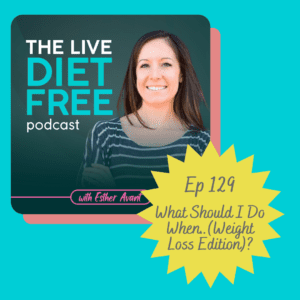Raise your hand if you’ve ever taken to social media to ask, “What should I do when…” and it felt like the floodgates opened and you were inundated with responses.
Go on, raise your hand, I’m raising mine too. I think we’ve all been there.
Asking questions on social media can be a bit of a double edged sword, though.
Sure you might get some legitimate advice from people who know what they’re talking about, but you’re also going to get a lot of advice from less than qualified (albeit well-meaning) people.
I see questions about weight loss so often and although we want there to be black-and-white answer, the truth is, it depends.
In today’s episode of The Live Diet-Free Podcast, I’m giving you four questions to ask yourself to make decisions for yourself based on your individual circumstances and not the loud opinions of people on the internet.
You can listen to the episode here…
Or keep reading the post below:
Some of the most often asked questions I see in Facebook groups that are centered around exercise and nutrition are:
- Should I track on vacation or no?
- If I eat whatever I want on Thanksgiving, am I going to ruin all my progress
- If I’m craving something, should I have it or a healthier swap?
- How do I know if I should take a rest day or push thru?
- When should I say “no” to a food pusher and when is it easier to just give in?
The loudest voices on social media are going to tell you things like “Live a little…you need to stay committed or you don’t really want this…listen to your body…it’s just one day…etc.” and in the end, you don’t really have solid advice.
This is why I say, in these particular scenarios, the answer is “It depends.”
The four questions below will help you work through your personal scenarios to arrive at an answer that leaves you feeling satisfied with your choices.
How often am I in this situation or one like it?
You likely aren’t taking all-inclusive vacations multiple times a year or celebrating your birthday more than once so there is some truth to the idea that those are isolated events and maybe you can loosen the reins a little.
The problem comes when you start to lump every trip or every special occasion into those categories and you find yourself justifying loosening the reins for days at a time each month.
If this is something that you’re faced with on a regular basis it’s more important how you respond to it.
If it’s something that truly happens once or twice a year, in the grand scheme of things, that is just a small blip on the radar and you’re response to it isn’t going to be as important.
What do I normally do in situations like this?
The best way to determine what you should do when you find yourself in a situation that challenges you, is take some time and think about what you have done in the past.
Choosing to follow through on old habits just because it’s what you’ve always done – knowing you’re going to be unhappy with how you feel later – isn’t helping you reach your goals.
It may be uncomfortable to do the work of introspection and decide if your past actions have been serving you, but it will make a difference in how you feel going into those situations in the future.
Am I happy with the consequences (or outcomes) of continuing to make those same decisions?
You have to take stock of how you feel about the consequences of the actions you’re choosing to take.
Are you happy with how you feel after you’ve eaten so much you don’t think you can move at the family get togethers?
What about when you skip out on your workouts when you’re just not feeling it, but you convince yourself that you’re too tired?
If it’s only happening every now and then, you’re probably not causing much harm, but if you’re regularly overindulging or putting off exercise, you’re sabotaging the progress you could be making.
What other options are available to me?
This is where you have to look at the gray area of each situation.
Maybe your body does need rest and it would be unsafe for you to be pushing 20lb dumbbells over your head, but that doesn’t mean you have to sit on the couch binge watching Netflix.
At Thanksgiving, your only options aren’t eat your way through a whole pie or only have a slice of turkey and 10 green beans.
You’re allowed to find a middle ground that gives you movement without pushing yourself to injury or exhaustion.
Setting parameters around the food that you eat doesn’t mean skipping the “fun stuff” every time, it just means choosing the things that are worth it and saying “no thank you” to the things that aren’t.
The only way to develop the skills to handle these situations is to do the work of introspection and then allow yourself to be in situations where you have to practice it.
Our Gone for Good program can help you build a toolbox of skills that you can pull from when you’re faced with these scenarios so the next time you ask yourself “What should I do when…” you’ll already have the answer. If you want more information, check out estheravant.com/coaching.


